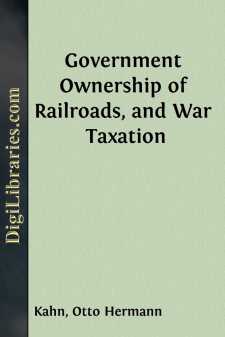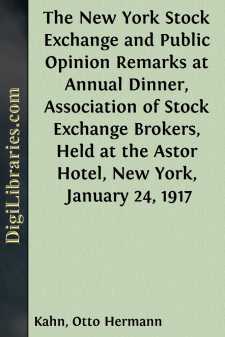Categories
- Antiques & Collectibles 13
- Architecture 36
- Art 48
- Bibles 22
- Biography & Autobiography 813
- Body, Mind & Spirit 142
- Business & Economics 28
- Children's Books 14
- Children's Fiction 11
- Computers 4
- Cooking 94
- Crafts & Hobbies 4
- Drama 346
- Education 46
- Family & Relationships 57
- Fiction 11828
- Games 19
- Gardening 17
- Health & Fitness 34
- History 1377
- House & Home 1
- Humor 147
- Juvenile Fiction 1873
- Juvenile Nonfiction 202
- Language Arts & Disciplines 88
- Law 16
- Literary Collections 686
- Literary Criticism 179
- Mathematics 13
- Medical 41
- Music 40
- Nature 179
- Non-Classifiable 1768
- Performing Arts 7
- Periodicals 1453
- Philosophy 64
- Photography 2
- Poetry 896
- Political Science 203
- Psychology 42
- Reference 154
- Religion 513
- Science 126
- Self-Help 84
- Social Science 81
- Sports & Recreation 34
- Study Aids 3
- Technology & Engineering 59
- Transportation 23
- Travel 463
- True Crime 29
Otto Hermann Kahn
Otto Hermann Kahn was a German-born American banker, philanthropist, and arts patron, best known for his significant contributions to the cultural life of the United States in the early 20th century. He played a key role in financing and promoting the Metropolitan Opera, where he served as chairman. Kahn was also a prominent supporter of modern art, theater, and music, fostering the careers of numerous artists and performers. Beyond his cultural influence, he was a successful investment banker and a partner at Kuhn, Loeb & Co., one of the most influential financial firms of his time.
Author's Books:
Sort by:
The term "high finance" derives its origin from the French "haute finance," which in France as elsewhere in Europe designates the most eminently respectable, the most unqualifiedly trustworthy amongst financial houses. Why has that term, in becoming acclimated in this country, gradually come to suggest a rather different meaning? Why does there exist in the United States, alone amongst...
more...
GOVERNMENT OWNERSHIP OF RAILROADS Paternalistic control, even when entirely benevolent in intent, is generally harmful in effect. It is apt to be doubly so when, as sometimes occurs, it is punitive in intent. The history of our railroads in the last ten years is a case in point. In their early youth our railroads were allowed to grow up like spoiled, wilful, untamed children. They were given pretty...
more...
A couple of weeks ago I went to Washington to contradict under the solemn obligation of my oath a gross and wanton calumny which, based upon nothing but anonymous and irresponsible gossip, had been uttered regarding my name. On my way between New York and Washington, thinking that, once on the stand, I might possibly be asked a number of questions more or less within the general scope of the...
more...
This is one of the best books that has appeared about the war. It shows conclusively why the United States must put this war through to a finish, and why every good American and every believer in liberty and civilization must be heart and soul against Germany. The fact that Mr. Kahn himself is of German origin emphasizes the contention which every good American should make, namely, that the Americans...
more...
This is a reprint, somewhat amplified, of an article printed recently in the New York Times. The original article was written before the recommendations of the Ways and Means Committee of the House of Representatives were reported. In a time of patriotic exaltation and of universal obligation and readiness to make great sacrifices to bring a most just and righteous war to a successful conclusion, the...
more...






